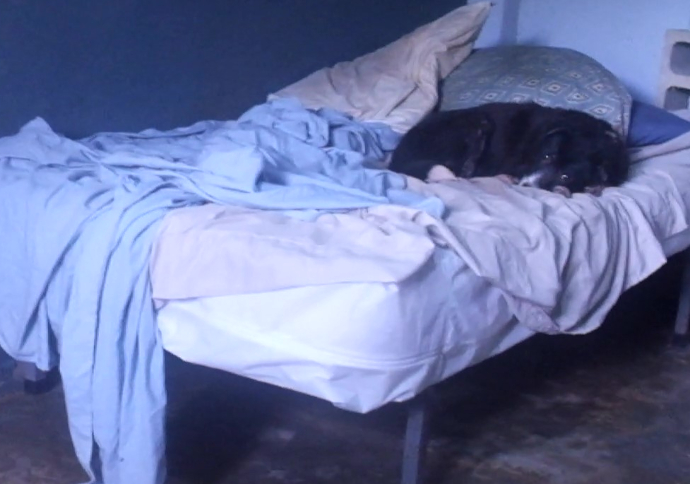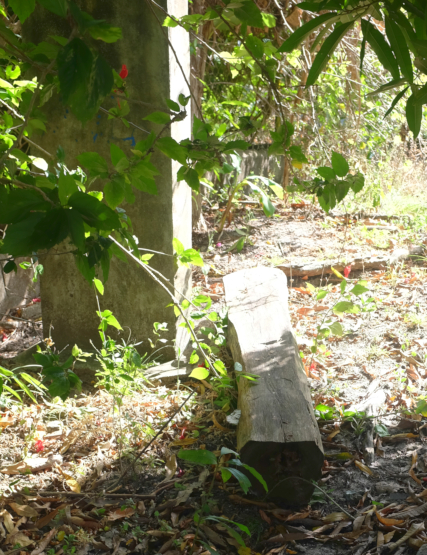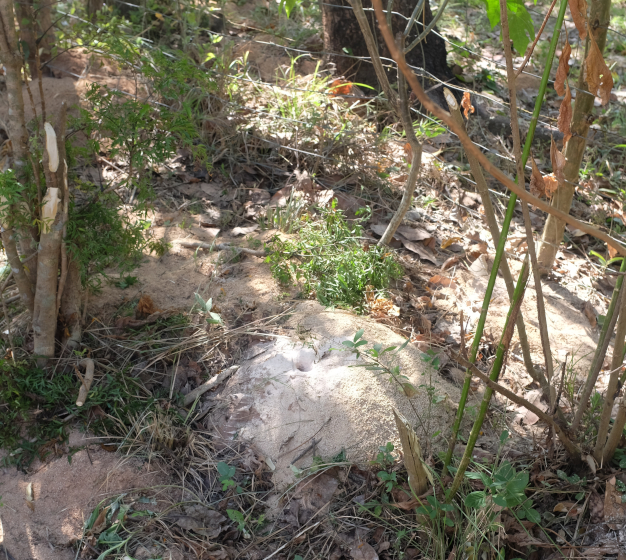What?!? Leave a warm bed in the cool pre-dawn hours? The Mama Dog, I believe the senior dog by age in the household since El Campeón’s passing last year — although Fulita has more time in the household – solves that conundrum by jumping to the spot that I just vacated. How horrible of a problem is this? If I don’t keep the insects and arachnids off of her, I might end up getting bitten by fleas or ticks, or even get mange. Even though she lives a fairly sedentary lifestyle these days, she IS a dog. So, just like Fulita and The Gimpy Dog, right after any bath with flea and tick soap, after being washed and rinsed she will, at first opportunity, roll around in something. Fortunately, El Bajito isn’t a fishing village. But with their hunting instincts, dogs want to smell sufficiently gross so that any prey doesn’t get tipped off by an odor – either dog germs or the soap that people put on dogs. With The Mama Dog it’s generally dust or mud, depending on the season – or grass. Her habit makes me wash the sheets and pillowcases more often than I otherwise would.
Day two offline… and onto farm chores
by Eric Jackson
Conked out a little before nine last night, woke up a little after four this morning. Usual dark hours sleep time for me, which may be supplemented by a daytime nap. Started with some trials and errors about reconnecting to the Internet, but no such luck.
Was it time to brew some coffee? Would have been but I had this pitcher of very strong, bitter stewed tea. Yes, I know that this is horrifying to many. I took a slightly more than half-gallon pitcher, minced a turmeric root and tossed it in the bottom, poured in the boiling water, tossed in eight teabags – two each of green tea with lemon, sweet spicy chai, white tea with blueberries and plain black tea – and tossed in a couple of bits of tangerine peel. Then I just let it sit. There was still hot water left in the kettle, so with that I made a mug of chai and I didn’t stew it. That I drank with a few drops of lemon juice and some sucralose, a break from the tasty lifelong bad habit of sugar and a bit more lemon juice. That was yesterday morning’s refreshment, but a day later there’s this strong stuff in the pitcher. The hope is that the turmeric, medicine I take as last year’s head injury slowly heals, will be stronger along with the darker color and more bitter taste. The caffeine seems to be stronger as well.
With first light, and wanting to give my hands a rest from the machete work today, it was inspection time. First order of business, the Cuban oregano looked thirsty so I watered that. The Mexican oregano is doing just fine.
Then I went to check the battle lines of a chemical war against the leaf cutter ants. The southeastern corner of my 900-square-meter lot is and long has been problematic. The adjacent neighbors have long been into burning cut grass, fallen leaves, cleared brush and so on, just across from my fence. It creates good conditions for anthills, which don’t happen very much in soils that are built by just leaving the cuttings and droppings to decompose where they are. When the ants spread so that they put in entrances to my finca, or into the street or the public right-of-way, I will put hormitox – fenitrothion – into all holes into which I see ants coming and going, and adjacent entrances as well.
Leaf cutter ants are farmers. Their nests are built around underground chambers where they grow fungi on the bits of leaves and flowers that they deposit. They won’t EAT your spinach garden – just quickly strip it bare and take it away to fertilize their fungus garden. Fascinating, socialistic peasant insects. But then, the Nazis also claimed to be socialistic. When the leaf cutter ants visit my garden, I see the merit in the most embarrassing and terrifying moment of Patty Hearst’s youth: “DEATH TO THE FASCIST INSECTS!”
One of the big problems with hormitox is that it kills too many other things. Those beneficial to humans and also very busy socialistic insects, the bees, for example. It’s also toxic to people, dogs and cats.
Back in the 90s Panama’s IDIAP agricultural research institute was promoting a vine that leaf cutters will strip and take back to their fungus farm, vegetation which turns out toxic to the ants’ fungi. I wonder how it turned out, and if it was a failure, why so. It there had been no problem with it, I think they’d still be promoting it.
The anthills at the southeast corner and at the northeast, under the dying cashew tree, both look deserted after yesterday’s chemical warfare offensive. It would be no big surprise to see survivors create a new entrance and start anew.
On to the fence security inspection, mostly out back. In the latter part of 2021 my oranges were all taken, as were most of my lemons and many of my star apples. Instead of putting up food this past year, I gave away a lot of that stuff anyway. I just didn’t have the energy after last June’s attack.
Farming in Panama always entails some theft losses – or should we call it various degrees of aggressive gleaning? Civilized people don’t throw a poor man into prison for stealing a loaf of bread, nor for a piece of fruit or two. But the fruit rustler who will strip a tree or an orchard and haul it away in a truck to sell to someone else? Like cattle rustling, a more serious crime. Both sorts of serious agricultural theft are more frequently reported in Panama in recent years.
Next door in Colombia they have had massive cattle rustling, sometimes government supported as in the El Aro Massacre, but of course never officially admitted. A tactic of war? Of course. However, it’s a war over control of rural areas on the political periphery. Communism versus fascism, or drug-connected terrorism? There’s all that in rural Colombian political violence, to be sure – but generally the money from drugs is one of the prizes being fought for, not the cause of the violence. The political labels that rural warlords take on are about what it’s convenient to profess, not about any world view that goes much beyond self-aggrandizement.
We have land grabbing in Panama, too. The seizure and destruction of crops, farm animals and farms was common enough the last time that a major civil war was fought on the isthmus, the 1899-1902 Thousand Days War across much of what was then Colombia It was very ferocious in what is now Panama’s Cocle province, from whence these words are written.
There are no armies or paramilitaries in the field practicing such stuff here. There are, however, little gangster thugs who think that they can steal from foreigners and get away with it. Also reprehensible elected officials who preach that foreigners – and Panamanian citizens born to foreign parents – have no rights. There are even parents who think it somehow patriotic to send kids to steal from those of ethnicities they don’t like, be it the Chinese-Panamanian grocer or the gringo with fruit trees.
And then you have a lot of Panamanians who are poor, who if the choice is between grabbing a piece of fruit from someone else’s tree and not eating that day will take the fruit. The ancient farming tradition of the Jews, Christians and Muslims of growing where some fruit will fall off of the farm and into the public path and leaving that to whoever comes along also exists in Panama. Any religion that stands the test of time is against both hunger and theft.
The common wisdom here? The crops that you don’t want stolen, grow close to the house where they can be watched over. Accept that there will be some losses at the edges.
The fence inspection? First of all, in the front and on the sides I am and have been well aware of where people hop the fences to come onto my little farm. In the back I had my suspicions.
One breach in the back, through which certainly many of this year’s lemons went, looks to have been built by multiple strong adults to be used by children. As in a heavy, old rustic wooden beam wedged between what was the electrical connection for one if the maleantes now in prison for the attack on my home and person last June – only the concrete slab remains of that dwelling now – and my back fence, just where somebody small can come in amid and shielded by hibiscus bushes that don’t have pickers, rather than the thorny citrus trees. Nearer to the electric meter than to the fence a cinder block kept the little ramp propped up. Had it not been there, the wooden piece was heavy enough that it may have toppled that section of the fence. It was like a rustic log, cut to be flat on one side. My guess is that it was a salvaged pillar, or part of one, from a casa de quicha.
Do I want to get into where such traditional Panamanian mud and wattle homes have been removed nearby, in recent times? Start making allegations based just on that circumstance and one runs the risk of a criminal defamation charge, but far more relevant to an honest journalist, just guessing wrong and practicing sloppy journalism to some innocent party’s detriment is bad enough.
I removed the beam that was leaning against my fence, busted up the block that was partly supporting it, and tried to lift the beam to carry over my shoulder. No such luck. Two adults, or perhaps one with the proper tools, lifted that. Perhaps the metal pole behind the slab for the electric meter was used as a gin pole.
In the northwest corner of my lot, the fence pole was just hanging loose, upright but the concrete foundation having been busted. Looks to me like one of the building materials trucks that occasionally go down there clipped the corner.
So, what to do? Short term, reinforce the fence in places where people have been going over with more barbed wired, and perhaps some inconspicuous sharp things sticking up from the ground on the inside of the fence where one would come over. Some concrete to reset that corner post. Longer term, replace those hibiscus bushes – some of which are termite infested anyway – with some thorny plants that would be discouraging to hop into.
The de luxe edition Der Estoppel automated death ray guard tower? You may not deny! But I really don’t intend to kill anyone in an argument over fruit. These days, is it considered un-American to have a sense of proportion like that?
Signs of human predation.
Insect farmers crossing over from the neighbors’ yard get the hormitox treatment before they get my garden.
Contact us by email at fund4thepanamanews@gmail.com
To fend off hackers, organized trolls and other online vandalism, our website comments feature is switched off. Instead, come to our Facebook page to join in the discussion.
These links are interactive — click on the boxes















